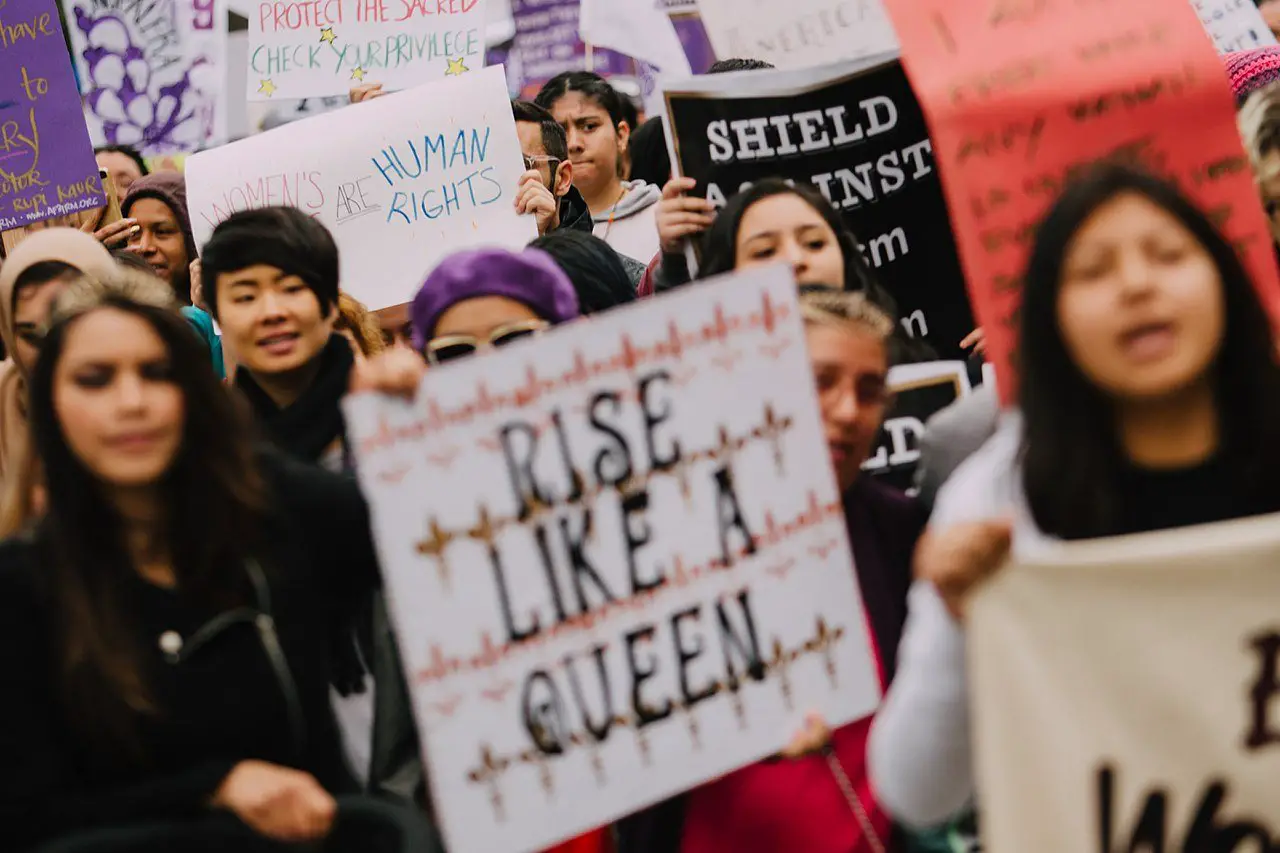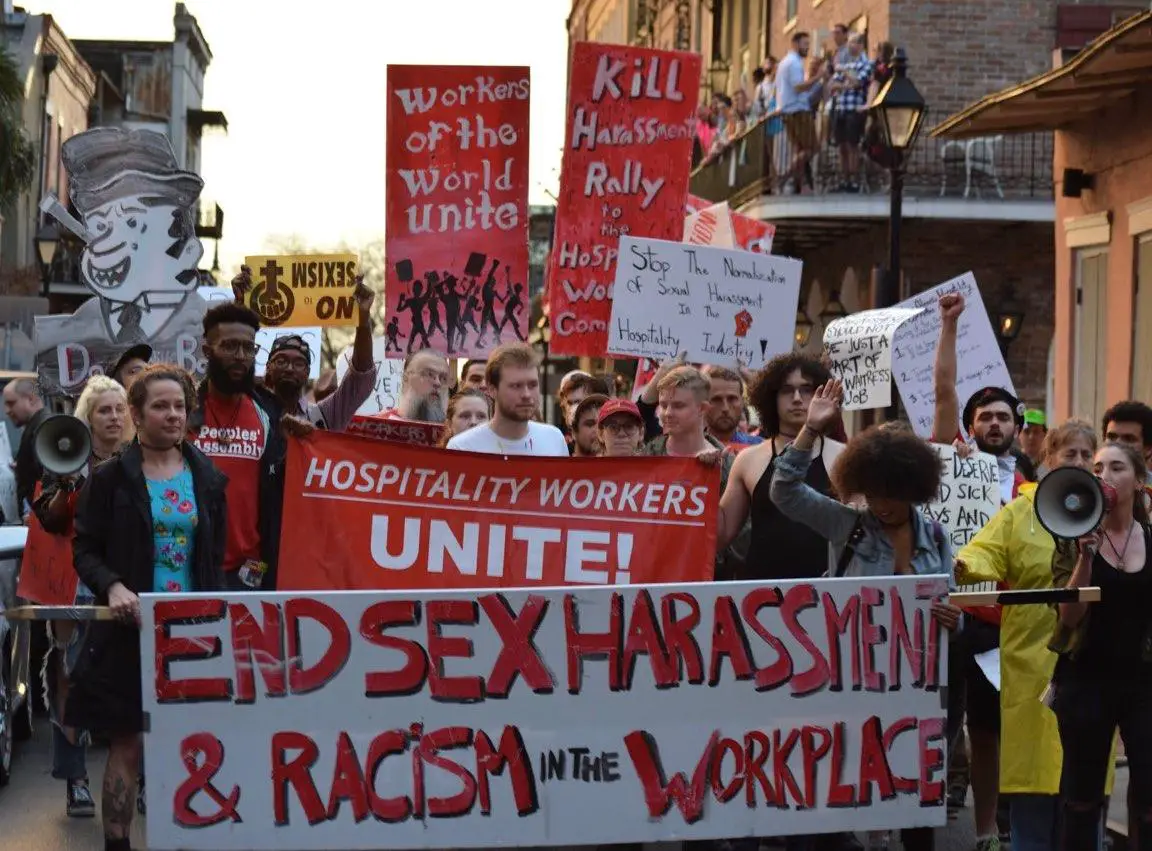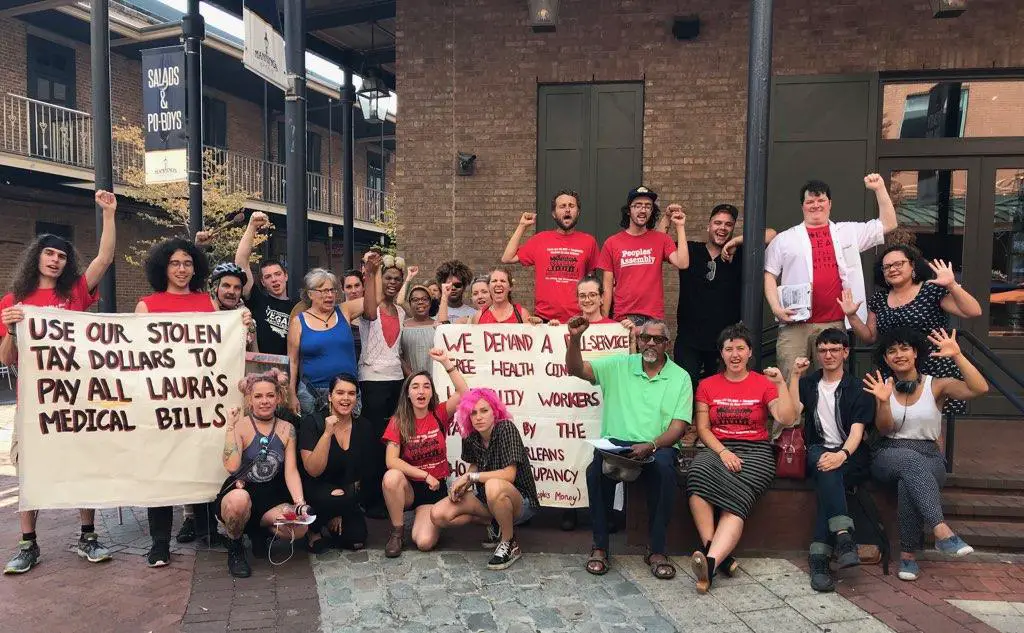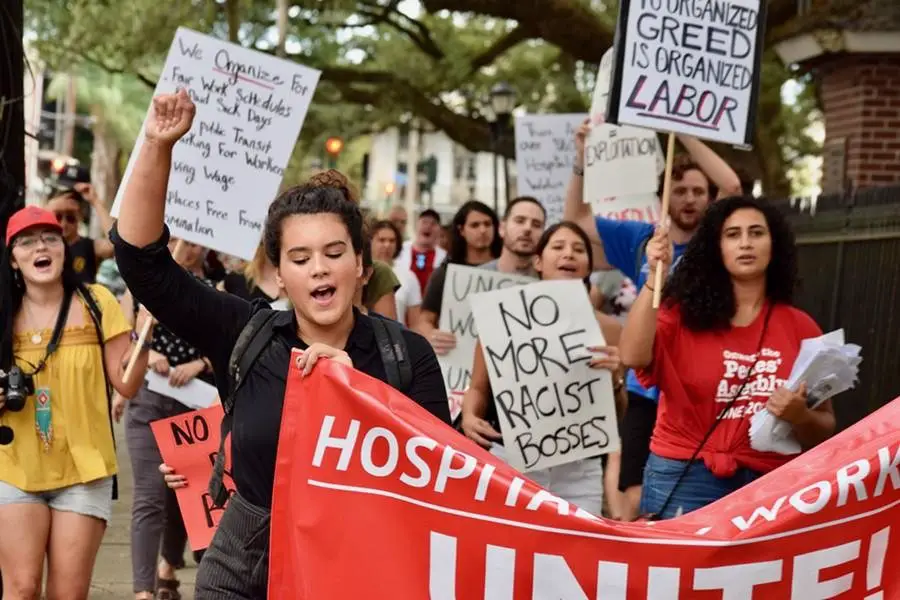
“The working class is anybody that is not a part of the ruling class. So if you have to go to work to pay your bills, you are part of the working class. It doesn’t matter if you have a masters’ degree or a Ph.D, if you have to work then you’re part of the working class,” says Christina Nesheiwat, a social worker and activist living in New Orleans.
In an ambitious plan to unite the working women of New Orleans, the New Orleans Hospitality Workers Alliance (NOHWA) is working with the New Orleans Peoples’ Assembly to organize a mass march for justice for the city’s hospitality workers. In honor of International Women’s day, the march will take place on March 16th, and is centered upon the demands that NOHWA has agitated for: to return the dedicated—or stolen, as some say—millions of dollars in annual hotel and food and beverage taxes from the private tourism and sports boards to services to support the city’s working class.
A Brief Primer on International Women’s Day
The move to set the march around International Women’s Day (IWD) is a celebration of the socialist roots of the March 8th holiday. International Women’s Day began as a socialist holiday in recognition of Universal suffrage and womxn’s participation in labor struggles—an explicit rejection of bourgeois feminism. The holiday was officially proposed by Socialist Clara Zetkin in 1910, at the second International Conference of Socialist Women in Copenhagen; it was first officially observed the following year. According to some sources, the 1910 holiday was proposed in part to honor a women-led garment workers’ strike that took place 50 years earlier.
Now IWD is a national holiday in 27 countries worldwide, and is celebrated without national recognition in a number of other nations. The intersection of “women’s work”—service work— and organizing places the New Orleans March 16th march into that lineage of women’s labor movements.

Fighting to survive
Currently, hospitality workers in New Orleans work extremely hard for low wages, with few legal protections.
“Something I’ve seen a lot in the industry is you have pregnant workers, and then they either get fired, or the boss is like ‘yeah you can come back’—but let’s say the worker had Thursday, Friday, Saturday night shifts—the money shifts—they come back to a Monday, Tuesday morning shift,” says Ashlee Pintos, a founding member of NOHWA who has worked in the hospitality industry for almost ten years.
NOHWA has drafted a work-week ordinance meant to protect pregnant workers and ensure consistency in scheduling, as well as give workers 12 paid sick days per year, the ability to take off for doctor’s visits, and accommodate parents going to parent teacher conferences. Currently, NOHWA reports that they have collected thousands of signatures supporting the measure.
Pintos says that many workers don’t even think that they have a right to work free from sexual and racial harassment, and NOHWA agitates hospitality workers with the goal of building their collective power.
“We want workers to be conscious of our power in the industry, because hospitality workers are meant to feel alone, in the way the industry is run. We don’t really feel our collective power, and that’s why we get pushed around so often by our bosses and management,” says Meg Maloney, a native New Orleanian and founding member of NOHWA.
According to the University of New Orleans’ most recent Metropolitan Report, the hospitality industry encompasses about 89,000 workers. Although this is almost a third of the city’s total population, representing thousands of people and their families, the industry is plagued with systemic racial inequality and issues of exploitation and harassment.
“We get paid 2.25 an hour, and it’s mentally demanding, because it’s so fast paced and you have to multitask like crazy while maintaining this superb amount of grace throughout the whole night, which is very exhausting,” says Sophia[1] who works at an upscale restaurant that is part of the Besh Restaurant Group.
“On a good night [with tips] you might make $25-30 an hour, but on a bad night you might not even make $10 an hour… meanwhile HR and people who are behind the scenes at the restaurant… they’re making salary, they’re making twice as much sometimes, they have sick days, paid vacation days and stability…that just isn’t there fore me. I’m replaceable,” says Sophia, who works full time for the restaurant.
Maloney, Pintos and Sophia all commented that the service industry can be fun and dynamic. However, there are serious downsides to the industry.
“The kitchen doesn’t even get tipped out… working over 40 hours a week for 11.50 an hour, making the dishes that is making this restaurant survive,” says Sophia.
In a report called “Benchmarking New Orleans’ Tourism Economy: Hotel and Full-Service Restaurant Jobs” by Robert Habans and Allison Plyer of The Data Center, the authors write that: “ like in hotels, the highest paid occupations in the full-service restaurant industry are disproportionately filled by white workers.” Depressingly, the authors conclude that: “of all metro New Orleans’ traded clusters, tourism jobs were the least likely to be “good jobs” …which pay a living wage or provide pathways to jobs in other occupations that pay a living wage.”
Hospitality positions also may lead to musculoskeletal problems associated with standing for long periods of time and carrying heavy trays (for servers), though the problem is under-studied. In a study published by the University of Cinncinatti, Ohio the researches write: “ While there is ample support of the risk factors commonly seen for servers, less than a handful of studies exist which focus specifically on restaurant service staff.”
One highly publicized study suggested that the waiting tables and other high-paced service jobs are more stressful than traditionally venerated positions such as surgeons and engineers, and came with a higher risk of stroke. The study utilized medical data from over 138,700 participants.
Despite these risks, many hospitality in New Orleans workers lack of access to affordable healthcare. At the same time, high rent, poor public transit, health care costs and childcare expenses create a squeeze on already low wages—as the cost of living in and around New Orleans continues to climb.
Yet last year, Nola.com reported that over ten million tourists spent over 7.5 billion dollars in New Orleans in 2017.
“The reality is that the entire economic system of New Orleans really rests on our back,” says Maloney.
“And all we have to do is buck a little bit for it all to go flying.”

Working Womxn
NOHWA and the People’s Assembly of New Orleans argue that the answer to the many injustices facing hospitality workers is for the revenue collected from hospitality taxes to go to support social infrastructure that can transform New Orleanians’ quality of life. Specifically, the March !6th Iinternational Women’s Day organizers of the march are calling for $20 million annually to be invested in free early childhood education , $50 million for sick and maternity leave for hospitality workers, vacation pay and a pension fund, $50 million to subsidize health coverage for hospitality workers, $40 million for free childcare centers and $20 million for infrastructure repairs.
By providing healthcare, paid sick leave and vacation time as well as free early childhood education and childcare, hospitality jobs can become “good jobs”, and uplifting hospitality workers will in turn create positive change and in the lives of the workers’ families and partners.
NOWHA and the Peoples’ Assembly say that the money to support the initiatives they want can be found in one place: $180 million dollars in dedicated taxes that the city collects every year from a tax on hotel stays and food and beverages. Dedicated taxes never enter the New Orleans general budget; the funds are funneled directly into private entities like the Tourism Marketing Board, the convention center’s board and that of the superdome.
In May 2018, NOWHA took to the Tourism Marketing Board with their demands (the Tourism Marketing Corporation received 11.8 million from dedicated hotel taxes in 2015, according to reporting from the Bureau of Government Research). The group claims it was then that the public conversation changed, and city councilors as well as Mayor Latoya Cantrell began to discuss claiming some of the dedicated tax revenue to be used for infrastructure.
“Which is important, but we can’t just fix streets and infrastructure and not invest in the people that live here and the people that make this city run,” says Pintos.
NOWHA met with all three of the city Councilmembers who sit on the Tourism and Marketing Board: Kristin Palmer, Jason Williams and Jay Banks to try and gain support for some of their budget to go to a healthcare clinic for hospitality workers. Despite their status as voting members on the board, Pintos says their support was tepid.
Their lobbying has brought the topic of the dedicated tourist taxes into the political realm, however, most calls for redistributing the tax dollars do not address the full sum of money going to the tourism and sports boards from the “tourist taxes”
“We want all of it,” says Angela Kinlaw, a spokesperson for the New Orleans People’s Assembly.

Marching Forward
Maloney says that NOHWA hopes that the March 16th rally continues to spark excitements among hospitality workers about organizing themselves and building community. The rally will feature speeches by and for hospitality workers.
“We want hospitality workers to feel seen, and to feel heard, and to be proud of being hospitality workers. People are looked down upon, you know, made to feel lesser but we say ‘you make the food that people come from all over the world to eat.’ Not only is that something deserving of respect, but that’s amazing.” Maloney.
Says Nesheiwat “We’re gonna continue to push, and we’re gonna continue to build, and we’re gonna continue to hold our government accountable to the people. Our tax dollars for our benefit.”
[1] Not her real name
Jesse Lu Baum is a queer writer and cartoonist originally from Brooklyn, New York. Her writing has been featured in publications such as Medium.com, The Jewish Daily Forward, The Mid-City Messenger and Preservation in Print. Aside from writing, she has also worked as a non-profit home repair person, a theater bartender, and a research assistant.










xxxhdfire.com melissa moore riding big black cock.
I certainly support better working conditions and better pay for hospitality workers. Beyond that, it’s certainly distressing that the hospitality industry involves such a large proportion of the City’s economy. That means that almost a third of the population is working as servants in one way or another. New Orleans really needs to diversify it’s economic base beyond tourism and real estate. Of course that will require vastly improving education to bring in new industries. Any business looking to establish itself will seek an educated workforce. I’m not New Orleans bashing, but I think New Orleans needs to get serious about education, and building the economy beyond tourism and Mardi Gras. Those are lucrative important and fun, but we’d be stronger if we worked harder to build other industries to grow the economy.